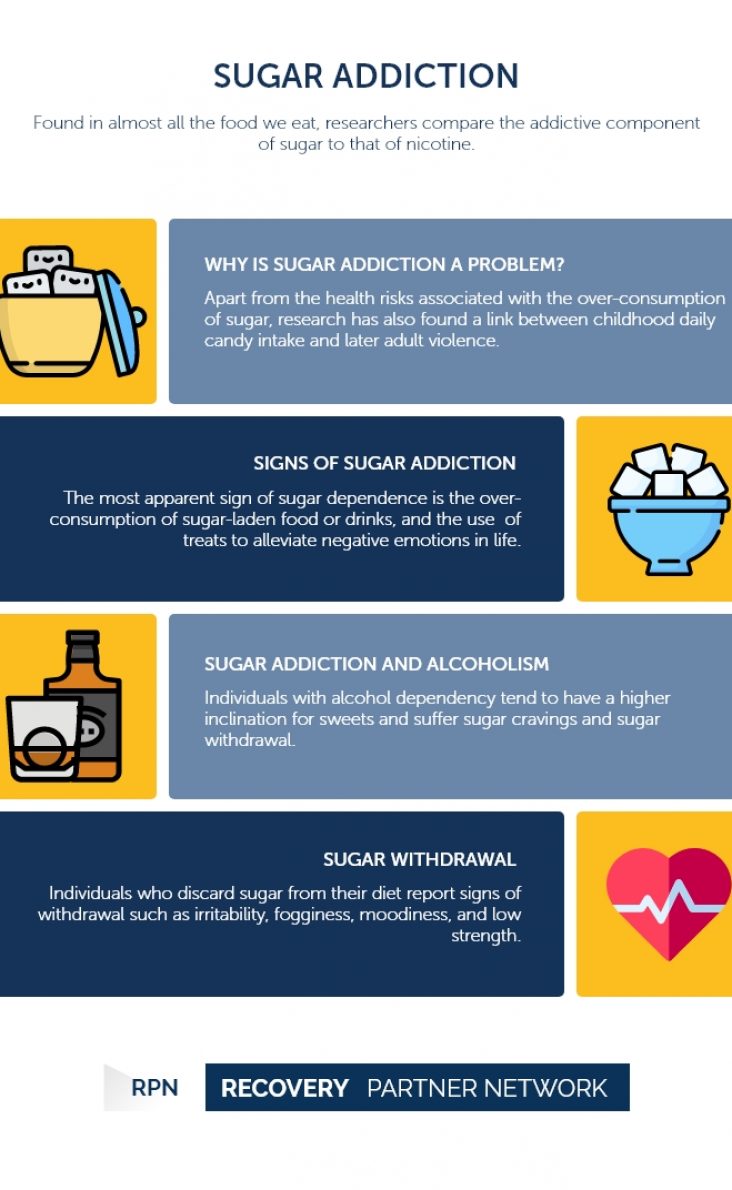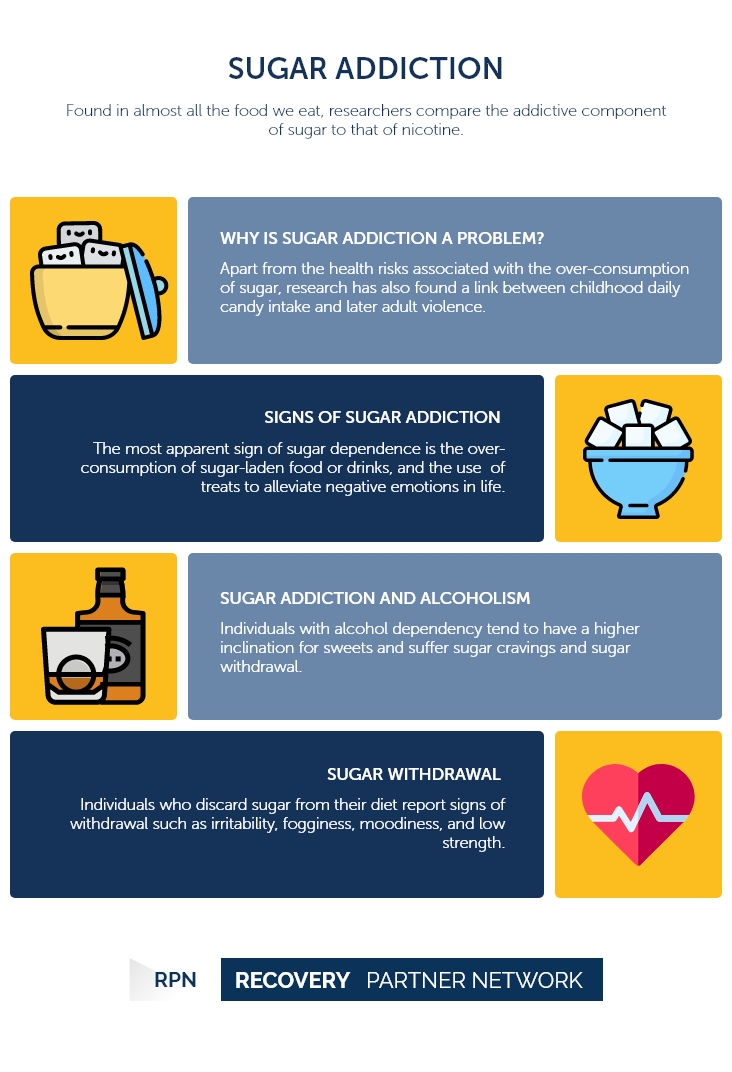Found in almost all the food we eat, researchers compare the addictive component of sugar to that of nicotine.
Sugar addiction
Sugar addiction | Table of Contents
Why is Sugar Addiction a Problem?
Cupcakes to cakes to iced coffee drinks, sugar is present in many foods and is almost virtually impossible to avoid. In the past decade, we have witnessed the amount of sugar we eat rise exponentially. Until recently, we had been consuming natural sugar found mainly in fruits. Sugar was only used as a small treat or was consumed in tiny amounts; hence it never became an issue. At present, more than a third of the calories we eat come from sugar or white flour, which is highly processed and behaves, much like sugar in our body. Our bodies are not designed to cope with such an immense load of sweetness. Sugar gives you an instant high, and then a crash, then a desire for more, eventually leading you to eat more sugar. It is this series of highs and lows that imposes unnecessary stress on your adrenals – leaving you anxious, moody, and ultimately, exhausted. (i.e., sugar is a mood-altering drug)
Emotional or psychological dependence on sweetened foods and drinks, also termed as sugar addiction, is a major concern for health officials in the United States since processed foods and processed grains produce extra sugar in the body once the liver metabolizes the food. Sugar is not harmful in moderation, but many overdo it. New research shows that Americans consume way too much sugar. Specifically, around 75 % of Americans eat excessive amounts of sugar, resulting in sugar-dependency.
Candies and chocolates, in particular, are highly advertised, specifically for children and women. This poses a problem since early childhood experiences often shape adulthood. High consumption of sugar during childhood is more likely to result in sugar dependency during adulthood.
Many children and adults turn into chocoholics due to over-consumption of sugar, which can later pose as a risk for caffeine addiction, as chocolate contains caffeine. Sugar is linked to many chronic problems, including lowered immunity, certain chronic infections, autoimmune diseases, heart disease, diabetes, pain syndromes, irritable bowel syndrome, ADD, chronic fatigue, and Candidiasis. Research indicates that one of the key causes of reduced immunity is the sugar’s ability to impede the entry of vitamin C into white blood cells, which then decreases immunity. The more sugar you have, the less productive your white blood cells are, and thus, the less immune you are. Sugar also induce insulin secretion in the pancreas, which, in effect, stimulates the production of triglycerides in the liver. Triglycerides are linked to stroke, heart disease, and obesity. This list of possible complications associated with sugar addiction is endless and. Therefore, it is always advised to take sugar in moderation.
Health risks are not the only issue related to the over-consumption of sugar. One research also found a link between childhood daily candy intake and later adult violence. Overuse of sugar has also played a major role in the obesity epidemic in North America.
FAQ
- What deficiency causes sugar cravings?
- What should I eat when I crave sugar?
- What vitamins help with sugar cravings?
Mineral and Zinc imbalances can cause sugar cravings. Generally, individuals who go through sugar cravings have very low levels of zinc, calcium, chromium, and magnesium.
Healthy and nutritious food such as fruits, berries, dark chocolate, chia seeds, legumes, and sugar-free yogurt can be great substitutes to fight sugar cravings.
Sugar cravings can be controlled through the use of supplements such as vitamin B, glutamine, lipase, fish oil, and chromium.
How Do People Develop a Sugar Addiction?
Sugar intake can lead to a short-term high and a spark of energy in the body. Certain studies have suggested that sugar is as addictive as cocaine since people tend to enjoy the dopamine release brought on by sugar. However, the addictive nature of sugar can make way for long-term health consequences such as obesity and diabetes, mainly due to the over-indulgence of sugar. Similar to other urges or behavioral addictions, sugar addiction poses a particular risk for people with depression, anxiety, and stress.
People who suffer from chronic tiredness may seek refuge in carb-rich sugary foods for a boost. Sugar delivers endorphins that combine with other chemicals in the body, leading to a surge in energy. Once someone mentally perceives sugar as an energy booster, they may begin to rely on it, usually unintentionally. People may use sugar to control irritability, emotional lows, and other conditions, and ultimately, there is little choice over avoiding sugary foods as one develops a sugar dependency.
FAQ
- How do you know if you have a sugar addiction?
- How long does it take to break a sugar addiction?
- How do I control my addiction to sugar?
The most common symptoms of sugar addiction include fatigue, cravings for sugary foods, muscle pains, nausea, insomnia, bloating, headaches, and lethargy.
Sugar addiction can be overcome within ten days.
Control your sugar addiction by avoiding sugary foods and drinks, replace your sugar with healthy substitutes such as fruits, watch for hidden sugar in packaged foods, and drink plenty of water to stay hydrated since dehydration can cause cravings.
Signs of Sugar Addiction
Unlike most substance use disorders or behavioral compulsions, sugar dependence is often easy to detect. The most apparent sign of sugar dependence is the over-consumption of sugar-laden food or drinks. Individuals with sugar addiction are also known to use treats to alleviate negative emotions in life.
Sugar Addiction and Emotional Eating
People may be enticed by sugar’s ability to provide instant energy and to make food taste good. Sugar offers some a “fast fix” after a long and stressful day, and certain people enduring breakups or other emotionally traumatic events often turn to chocolate or pints of ice cream to soothe themselves. However, people who turn to sugar to cope with emotional problems are more likely to become addicted. Other indicators of sugar addiction for emotional relief include weight gain and difficulties concentrating on everyday obligations. Resulting in feelings of helplessness and lower self-esteem, which, in turn, can further lead to more sugar consumption and severe addiction.
Sugar Addiction and Binge Eating
Binge eating is a particularly worrisome feature of sugar addiction. Binge eating is all about eating too much too quickly, followed by instant feelings of guilt, shame, and disgust. Binge eating is an unhealthy form of emotional support and self-medication. It is important to remember that food, particularly sugar, is only a short-term fix for emotional conditions.
Sugar Addiction and Anxiety
Sugar craving and anxiety have a direct and strong connection to one another. Eating disorders such as binge eating or anorexia arise from underlying causes, and the person suffering from such disorders often struggles with psychological and emotional issues. Stress eating is a common example of the relation between eating disorders and anxiety, and sugar intake is generally associated with stress eating.
Anxiety releases a stress hormone named cortisol into our body, and for some, this means not being hungry, but for those who love sugar, stress, and anxiety can lead to more cravings. In cases of sugar addiction combined with eating to soothe anxiety, the result is usually weight gain. Although sugar initially raises serotonin levels in the brain, sugar can exacerbate anxiety, as low sugar can lead to feelings of exhaustion and depression.
Sugar Addiction and Alcoholism
There is a remarkable genetic link between children of alcoholic parents and sugar addiction. New research has confirmed that the dopamine receptors in the brain light up when we eat sugar, equivalent to the receptors that light up in the brain of someone who drinks alcohol. This can promote people who struggle with sweet consumption into alcoholism or moderate alcohol consumption. People with alcohol dependency tend to have a higher inclination for sweets and suffer sugar cravings and sugar withdrawal. The genes of parents who use alcohol, as well as their desire for sugar, are passed on to their children, and as a consequence, the kid is now predisposed to all of these compulsions.
Sugar Withdrawal
Those who discard sugar from their diet report signs of withdrawal such as irritability, fogginess, moodiness, and low strength. Since many of those dealing with sugar addiction binge on sugary foods, withdrawal and cravings can be particularly severe. Unfortunately, many choose to go back to eating sugary foods to induce a chemical release in the brain to get respite from withdrawal. However, a much better alternative would be a dietary swap, where the sugar consumers swap unhealthy sweets for more natural and healthier alternatives.
Numerous clinical studies have found evidence that sugar causes physiological and behavioral effects, identical to those induced by addictive drugs. Furthermore, in a 2016 animal study, researchers found that long-term exposure to high sugar levels causes brain changes, similar to those linked with nicotine addiction.
FAQ
- What are the psychological symptoms of sugar withdrawal?
- How can I flush sugar out of my system?
- Is there a medication for sugar addiction?
Withdrawal symptoms of sugar addiction may include depression, anxiety, changes in sleep patterns, and cravings.
Staying hydrated, exercising, eating proteins and fats can help flush the sugar out of your system.
Varenicline, which is meant for the treatment of nicotine addiction, can help reduce cravings for sugar.
Recovery Partner Network
We aim to educate and empower. If you feel our library of resources does not cover your specific need, reach out to us, and we would be happy to help.
STATISTICS
© Copyright 2026


